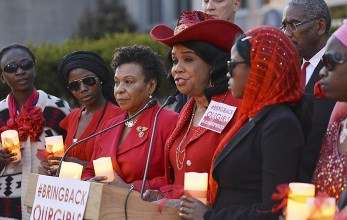Three years ago, Boko Haram terrorists burst into dormitory rooms at the Government Secondary School in the northern Nigerian town of Chibok and kidnapped nearly 300 girls simply because they dared to get an education. In the days leading up to anniversary of their kidnapping, there were plenty of headlines devoted to the “Chibok girls,” as these now young women are famously known. On April 14, 2017, we reached another sad milestone. Some of us paused to remember the anniversary of this horrific, ongoing tragedy. Soon the news reports will fade and the story of the still missing Chibok girls will slip once more to the backburner.
The 195 Chibok girls who haven’t been able to escape their captives or were not among the 21 released last October, are still the most compelling symbols of the Boko Haram insurgency, but we must never forget that the group has committed increasingly heinous acts in the past three years from which innumerable victims may never recover. Let me count the ways.
More than 2.6 million people are currently displaced across Nigeria and its neighbor nations in the Lake Chad region, and Nigeria is in the process of building a comprehensive orphanage to house approximately 8,000 children who’ve been separated from their parents. At least one million children have been forced out of school. Millions more Africans are at risk of starving to death and countless men, women and children all of ages, both Christians and Muslims, have been kidnapped, tortured, and/or killed.
It gets worse. In addition to engaging in the human trafficking of women, forcing them into sexual and domestic slavery, the insurgents also use children as suicide bombers. Even ISIS, to whom Boko Haram has pledged allegiance, has expressed concern that the group goes too far.
As a mother, a former educator, and indeed, a human being, I have felt heartbroken, shocked and angered by the daily horrors our West African sisters and brothers have been forced to endure. The actions of the world’s most deadly terrorist group have also emboldened me to use my voice and every resource available in the fight to ensure that the Chibok girls are not forgotten and to help eradicate Boko Haram and repair the damage it has caused.
I have traveled twice to Nigeria to meet with victims’ families and government officials and brought the #BringBackOurGirls movement to the United States. Each week that Congress is in session, lawmakers from both sides of the aisle participate in a “Wear Something Red Wednesday” social media campaign that helps maintain pressure on the Nigerian government to keep working to negotiate the release of the remaining Chibok girls and pull out all stops to defeat Boko Haram.
On December 14, 2016, President Barack Obama signed into law legislation that Senator Susan Collins (R-Maine) and I sponsored that directs the U.S. secretaries of State and Defense to jointly develop a five-year strategy to aid the Nigerian government, the Multinational Joint Task Force created to combat Boko Haram, and international partners who’ve offered their support to counter the regional threat the terrorists pose.
In a telephone conversation between President Donald J. Trump and Nigerian President Muhammadu Buhari in February, the two leaders pledged “to continue close coordination and cooperation in the fight against terrorism in Nigeria,” according to a readout from the White House. Secretary of State Rex Tillerson also has reportedly praised the Multinational Joint Task Force’s efforts to defeat Boko Haram a “success story,” but while the terrorist group may be down, it is far from out.
On June 12 we will mark another milestone in this terrible saga. That is the day the State and Defense departments’ five-year plan is due. It also is the deadline for the director of National Intelligence to assess the willingness and capability of Nigeria and its regional partners to implement the strategies outlined. We must use our collective voice to ensure they don’t miss this urgent deadline.
By now you may be asking yourself why any of this should matter to African Americans who are fighting their own battles to close the economic and opportunity gaps that still exist here at home and to exercise fundamental rights like the right to vote. Some of you may have never even heard of the Chibok girls. But if we don’t, who will? If we don’t teach the world to acknowledge that Black lives matter across the globe, who will? Until then, it will continue to cry for victims of terrorism in European nations, the Middle East and even Russia, while African and African-American lives lost go ignored.
Congresswoman Frederica S. Wilson is a member of the Congressional Black Caucus and represents parts of northern Miami-Dade and southeast Broward counties. She serves on the House Education and the Workforce Committee and the House Transportation and Infrastructure Committee. To learn more about Congresswoman Wilson’s work in Congress, please visit her Facebook and Twitter pages and congressional website.

